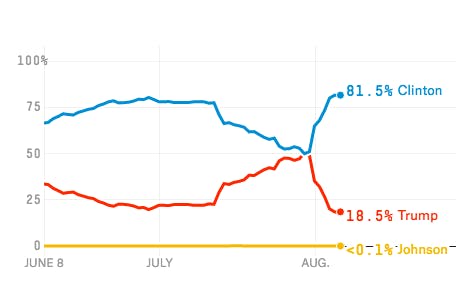In many ways, Donald Trump’s mesmerizing self-destruction last week seemed almost rehearsed, like a building implosion in human form. His fixation with settling the score against the Khan family was the primer charge, which triggered a series of connected explosives, resulting in this, from FiveThirtyEight’s polls-only forecast:


The process unfolded too rapidly for Republicans to cycle through the stages of grief over one explosion before another went off. In the crude overlap of anger, bargaining, and denial that resulted, some anti-Trump conservatives clung to the hope that Trump would leave the campaign, either voluntarily or through public pressure, and the party could press ahead to November with a new and not altogether unhinged nominee.
This isn’t contingency-planning so much as the kind of prayer an atheist might resort to in an earthquake. The desperation is understandable, of course: A horrific candidate like Trump threatens not just to cost Republicans the presidency, but to precipitate a down-ballot wipeout that erases the enormous gains the party has made in off-year elections during the Obama era.
But the #NeverTrump fantasy actually runs much deeper than salvaging purple-state Senate seats. As long as these conservatives are dreaming about the
unlikely scenario in which Trump exits the race, it’s worth contemplating how rapidly these conservatives would fall back in line as loyal Republican foot soldiers if that happened—and thus how fleeting some of their own critiques of their party at the moment really are.
If Trump stays in the race, and the #NeverTrump crowd ends up costing him the presidency, they will have done a remarkable thing for the country. But the irony is that the Republicans most committed to defeating Trump are generally the most misguided or in denial about the status-quo ante in Republican politics. They’ve blamed the party for being culpable in Trump’s rise. But they want the nominee out because, despite everything that’s happened, they still believe the GOP can be entrusted with control of every branch of government.
Instead of #NeverTrump how about #BringBackOurParty
— Eli Lake (@EliLake) March 3, 2016
What would a Trump exodus look like from the perspective of his most committed conservative critics? Begin with the fact that their campaign of opposition to Trump has placed them at odds with many of their own heroes. In the current issue of The Weekly Standard, conservative writer Jonathan Last compared House Speaker Paul Ryan to a French Nazi collaborator who was sentenced to death for treason. Of all Trump’s endorsers, conservative New York Times columnist David Brooks explained, “If you’re not in revolt, you’re in cahoots.”
Conservatives like Last and Brooks argue that supporting Trump is a moral failing, and that some of the Republicans they most admire, like Ryan and Senator Marco Rubio, have failed a basic moral test. They are also the conservatives who most want Trump to exit the race.
But Trump is now more than two weeks into the general election, after a campaign for the Republican nomination that lasted a year. He enjoys overwhelming support (more than 80 percent) from Republican voters. And in the face of that support—with their careers and ideological agendas on the line—most Republican leaders have submitted to Trump’s takeover. This includes the vast majority of GOP officeholders who once represented the party’s supposedly bright future: Ryan, Rubio, Scott Walker, Mike Pence, and many, many others.
By contrast, the Republican officeholders and elder statesmen who have opposed Trump—from Mitt Romney to Ted Cruz to John Kasich—have mostly seen their stars fall within the party.
If Trump were to exit the race against the will of his millions of supporters, the party would be practically obligated to hand the nomination to someone who had made his peace with Trump, rather than to a #NeverTrump heretic—after all, their problems at the top of the ticket and down ballot would only be exacerbated if they alienated Trump’s base. Thus, in effect, the conservative activists and intellectuals who most want Trump to exit the race are asking for a new nominee who, by their own lights, will have been irreparably tarnished by acquiescing to Trump in the first place.
It is safe to assume that the #Never Trump crowd’s moral aspersions would be flushed down the memory hole the moment Trump vacated the nomination. What stands now as a consensus of both liberals and conservative #NeverTrump types—that the Republican leadership is complicit in Trump’s takeover of the party, and that the party should be judged by its acquiescence to him—would collapse.
"RNC is authorized to reconvene the national convention." Could be done by Labor Day. Nominee would defeat Hillary.https://t.co/DFP6MxMCQy
— Bill Kristol (@BillKristol) August 5, 2016
It's indecent to defend Trump. I can defend flip-flopping—or attack it!—but I won't associate w/ a party led by so many indecent ppl. 13/13
— Jay Cost (@JayCostTWS) July 27, 2016
The main strategic fantasy underlying the hope that Trump might relinquish the nomination isn’t that Republicans could stave off down-ballot losses, but that they might sweep a year of damning revelations about the party under the rug and spin their way into unified control of government as if none of it ever happened.
